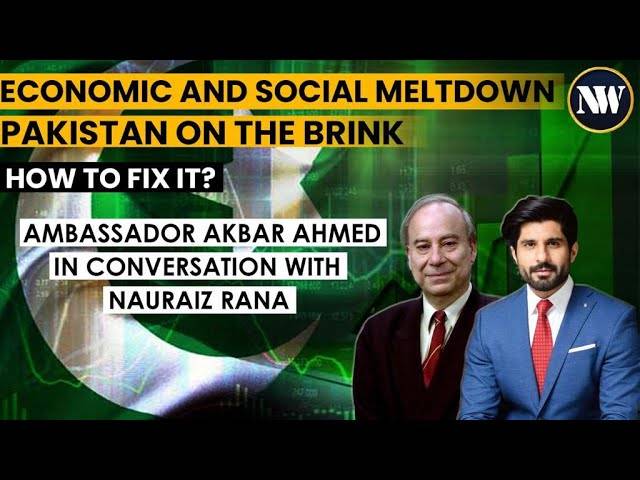In a world that is becoming increasingly interconnected and interdependent, understanding the intricate fabric of nations and their sociopolitical dynamics is of paramount importance. Pakistan, a nation rich in history and diversity, grapples with multifaceted challenges that are deeply rooted in its grand narrative and sociopolitical realities. In a candid and illuminating conversation, Dr. Akbar Ahmed, a distinguished scholar, and former Pakistani ambassador, sheds light on some of the most pressing issues facing the nation today.
The conversation begins with an exploration of the concept of a grand narrative – a powerful and unifying story that forms the foundation of a nation's identity. Dr. Ahmed emphasizes that a strong grand narrative is essential for a cohesive society, allowing diverse communities to find common ground and shared purpose. He draws a poignant comparison between Pakistan and its neighbor, India, highlighting the role of grand narratives in shaping their trajectories.
"In India, they began their grand narrative at the end of the 19th century, and by the early 20th century, they had Savarkar and Golwalkar, the two ideologies which would later be Hindu Hindutva. This is their grand narrative – a land where they would be only Hindus, Muslims, and Christians who they see as invaders and very often use very negative terms for them. They would be removed. Now, are they going to kill them all or exterminate them? There's a lot of violence in the air and a lot of violence happening," Dr. Ahmed remarks.
This comparison raises a thought-provoking question about Pakistan's own grand narrative. Dr. Ahmed suggests that Pakistan's grand narrative has been betrayed in recent times, leading to a sense of disillusionment among its people. He underscores the importance of leaders embracing all segments of society – from artists and intellectuals to writers and filmmakers – and fostering a collective sense of pride and identity.
Another crucial theme that emerges from the conversation is the delicate balance between the center and periphery within Pakistan. Dr. Ahmed points out that historically, the dominance of the center over the periphery has caused tension and grievances. He explains that the dominance of Punjab, the largest province, in politics, education, and military representation has left smaller provinces feeling neglected and marginalized.
"The demographic structure of Pakistan is a tragic reality, and it's not because Punjab has something negative, but the fact that it is the largest province, it is the province representing the Army and politics, and it has some of the finest educational institutions. So, you'll find that the majority of the politicians or even army officers come from Punjab schools," Dr. Ahmed elucidates.
This imbalance between the center and periphery is not unique to Pakistan; it is a universal challenge that many nations face. Dr. Ahmed's extensive research, including his study titled "The Thistle and the Drone," highlights the recurring pattern of dominant centers ignoring the concerns of marginalized peripheries. He emphasizes the importance of addressing these grievances to prevent the disintegration of society.
The conversation then delves into Pakistan's socioeconomic landscape, where issues of education, governance, and economic disparity take center stage. Dr. Ahmed candidly discusses the challenges Pakistan faces in capitalizing on its strengths and resources, comparing it to India's remarkable transformation into an economic powerhouse. He attributes Pakistan's struggle to a lack of investment in education and a failure to prioritize the development of human capital.
Dr. Ahmed's insights resonate deeply as he highlights the need for a multi-dimensional approach beyond just economic figures. He emphasizes the role of intellectuals, artists, and educators in shaping a nation's progress and urges leaders to recognize and harness the potential within the diverse population of Pakistan.
"The leaders have to embrace all of Pakistan and see these filmmakers, these artists, these intellectuals, the editors, the writers – they're part of the society. How do we move them forward? That idea has still not taken root. So, very often, you'll see people will respond if you belong to the brotherhood, if you have some sifarish, or you're not going to get anywhere," Dr. Ahmed asserts.
As the conversation draws to a close, Dr. Ahmed's message is clear: Pakistan's path forward requires a comprehensive and inclusive approach that addresses historical grievances, nurtures a sense of shared identity, and prioritizes education and human development. He emphasizes the urgency of fostering a grand narrative that unites all Pakistanis, regardless of their ethnic or religious backgrounds.

